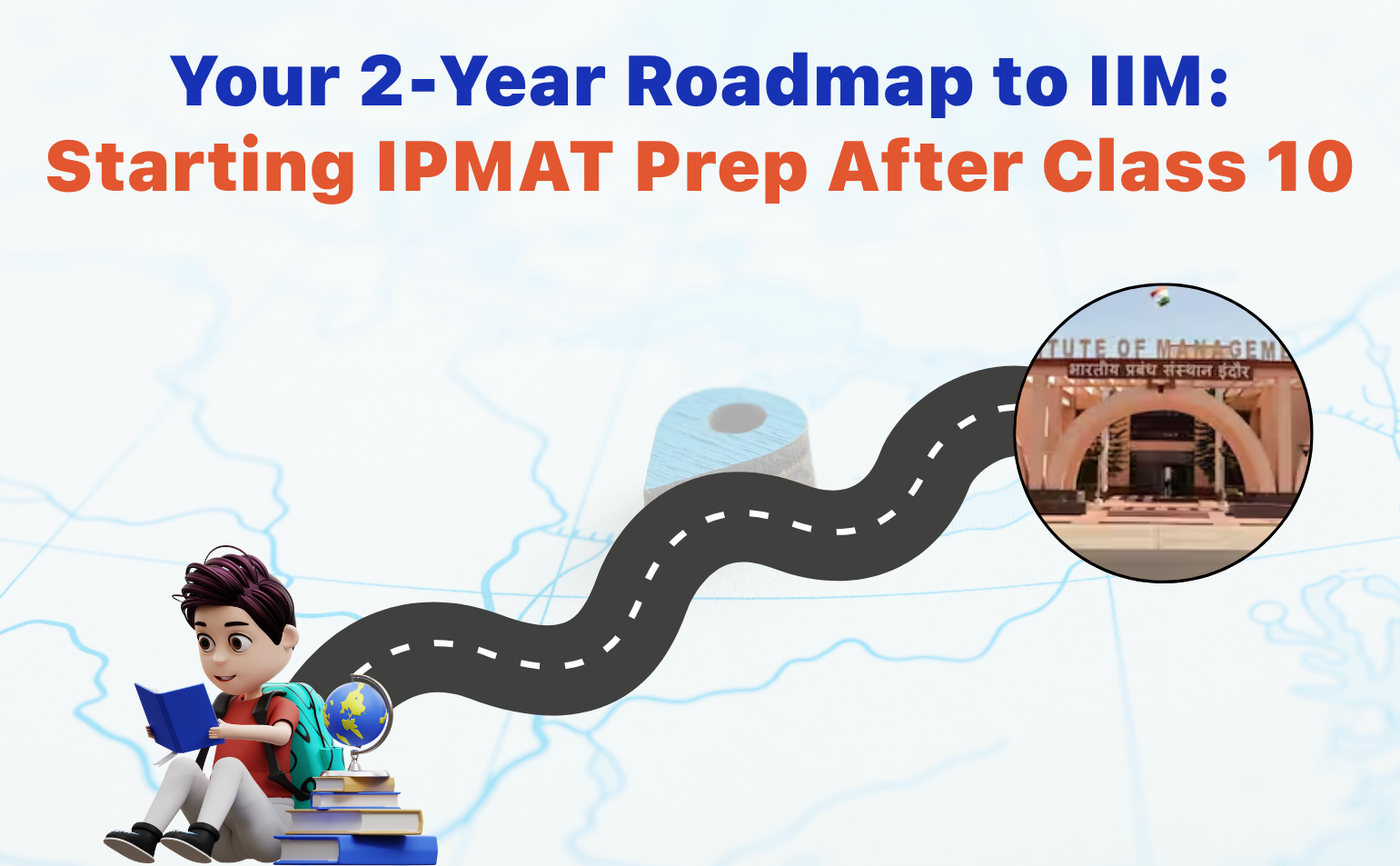If your child is academically driven and dreams of joining the Indian Institutes of Management (IIMs), they don’t need to wait until after graduation to get started. Thanks to the Integrated Program in Management (IPM) offered by IIM Indore, Rohtak, and others, students can now enter these top B-schools right after Class 12 through the IPMAT exam.
However, with limited seats and rising competition, waiting until Class 12 to begin preparation can be a risky bet. The smartest families are starting early, often right after Class 10 board exams, to give their child a strategic advantage.
This blog provides a step-by-step, month-by-month roadmap for the next two years, tailored for students who want to begin their IPMAT journey immediately after Class 10. It covers everything you need to know:
- Why early preparation matters
- A 24-month preparation timeline
- Subject-wise strategies
- Monthly milestones
- Coaching vs. self-study
- Resources to use (and avoid)
- FAQs and expert tips for parents
Whether you’re a parent seeking clarity or a student ready to take charge, this is your ultimate guide to navigating IPMAT prep smartly and stress-free.
Let’s start your journey toward IIM not in college, but in Class 11 itself.
Why Start IPMAT Prep After Class 10?
For many parents and students, the natural instinct is to begin thinking about career options only after Class 11 or midway through Class 12. However, if your child has aspirations to join an IIM directly after Class 12, starting IPMAT preparation just after Class 10 can provide a major strategic edge.
Here’s why:
1. Early Start = Strong Foundation
The IPMAT (Integrated Program in Management Aptitude Test) by IIM Indore and IIM Rohtak demands a high level of proficiency in Quantitative Aptitude, Verbal Ability, and, for Rohtak, Logical Reasoning.
- These skills are not built overnight.
- Starting early gives your child the time to master the basics, revisit them often, and improve speed and accuracy gradually.
- Concepts like percentages, ratios, speed-time-distance, and grammar rules can be built step-by-step instead of being rushed in Class 12.
2. Class 11 Has a Lighter Academic Load
Compared to the intense pressure of Class 12 boards, Class 11 offers more breathing space.
| Class | Academic Pressure | Coaching Load | Ideal for IPMAT Prep? |
| Class 10 | High (Board year) | Often none | Not ideal to start fully |
| Class 11 | Moderate | Manageable | ✅ Best time to begin |
| Class 12 | High (Board + IPMAT) | Peaks | Only for revision & mocks |
3. Compounding Effect of Consistency
Like in investing, small efforts over time lead to huge results. If a student even practices 5–10 questions a day for 2 years, they’ll have solved over 3000+ questions in Quant alone.
Early starters don’t need to study 5 hours/day. They just need to:
- Study for 1–1.5 hours/day
- Follow a monthly planner.
- Build mock test discipline early
4. You Stay Ahead of the Competition
Most students start preparing for IPMAT in Class 12 or even after the boards. This leads to:
- Rushed preparation
- Shallow understanding
- Low mock test scores
On the other hand, students who start early can:
- Practice full-length mocks in Class 12
- Focus on fine-tuning rather than learning from scratch
- Appear more confident in Personal Interviews (PI)
Summary Table: Why Start IPMAT Prep After Class 10
| Reason | Benefit |
| Early foundation in aptitude | Better clarity, gradual improvement |
| Lighter Class 11 schedule | Time for consistent prep |
| Consistency pays off | Higher accuracy and speed in mocks |
| Beat late starters | Better odds of 99%ile score |
Complete 2-Year Timeline for IPMAT Preparation
Starting your IPMAT journey just after Class 10 gives you a full 24-month runway to build, strengthen, and perfect your aptitude for one of the most competitive UG entrance exams in India.
We break the timeline into four phases of six months each, aligned with the student’s academic year:
Year 1 – Class 11: Foundation Phase
Phase 1: Foundation Building (June–November)
This is the most important phase, which focuses on developing conceptual clarity in Quant and building a reading habit for VARC.
| Focus Area | Weekly Target | Tools & Resources |
| Arithmetic basics | 3 topics/week | NCERT 9–10, RS Aggarwal |
| Vocabulary building | 20–25 words/week | Word Power Made Easy |
| Reading Comprehension | 2 editorials/week | The Hindu, Indian Express |
| Logical puzzles (optional) | 1 hour/week | Puzzle books, online apps |
| Sectional Mocks | 2 per month | Beginner-level IPMAT mocks |
Phase 2: Skill Enhancement (December–May)
By now, your child will have a good grip on fundamentals. Time to raise the bar with topic-wise questions and speed practice.
| Focus Area | Weekly Target | Tools & Resources |
| IPMAT-style Quant | 20–25 questions/week | Previous year Qs, Tarkashastra mocks |
| RC Practice | 2 long and 2 short passages/week | Online test series |
| LR (for IPMAT Rohtak) | 2 topics/week | Input-output, Syllogisms, etc. |
| Mock Tests | 1 Full-length mock/month | Track performance in Excel or Google Sheets |
| Mentorship | Optional but helpful | Join a foundation batch or group study |
Pro Tip: Use Google Sheets or Notion to track topic coverage, test scores, and revision cycle.
Year 2 – Class 12: Mastery & Mock Phase
Phase 3: Intensive Practice & Time Management (June–November)
This is the make-or-break phase. Students should aim to complete the syllabus by September and focus on mock strategy and accuracy from October onward.
| Focus Area | Frequency | Goals |
| Full syllabus coverage | June–Sept | Quant, VARC, LR (Rohtak) |
| Timed Practice Sets | Alternate days | Develop speed and stamina |
| Mock Tests | 1 every 10 days | Benchmarking and pattern identification |
| Error Logs | After every mock | Learn from mistakes, not just attempt more |
| GK (for PI/JIPMAT) | Weekly reading | Maintain notes on static + current affairs |
Phase 4: Final Sprint & Revision (December–April)
With the exam around the corner and board exams overlapping, smart planning is crucial.
| Focus Area | Frequency | Tips |
| Mocks | 2–3 per week | Analyze thoroughly, simulate exam day |
| Sectional Tests | Alternate days | Rotate between Quant, VARC, LR |
| Revision of formulas, words | Daily (15–30 mins) | Use flashcards or short notes |
| Time Management Practice | Weekly | Try 90-minute and 120-minute simulations |
| Class 12 Boards | Plan study slots | Use Sundays for board-only revision |
Visual Summary: IPMAT 2-Year Prep Timeline
| Phase | Timeline | Goals |
| Phase 1: Foundation | June – Nov (Class 11) | Build basics in Quant, RC, and Vocabulary |
| Phase 2: Skill-Building | Dec – May (Class 11) | Introduce IPMAT-level Qs, start mocks |
| Phase 3: Advanced Prep | June – Nov (Class 12) | Full syllabus + accuracy + speed |
| Phase 4: Final Sprint | Dec – April (Class 12) | Mock mastery, revision, board balance |
Subject-Wise Strategy for IPMAT Preparation
IPMAT primarily tests a student’s proficiency in three areas:
- Quantitative Ability (QA) – Common to both IIM Indore and IIM Rohtak
- Verbal Ability (VARC) – Also common to both
- Logical Reasoning (LR) – Only for IPMAT Rohtak and JIPMAT
Let’s break down the ideal strategy for each subject, starting from Class 11 and continuing through Class 12.
Quantitative Ability (Math)
Quant is the most feared yet decisive section in IPMAT. IIM Indore, in particular, is known for its higher-level QA questions, often going beyond Class 10–11 difficulty.
Key Topics:
| Arithmetic | Algebra | Geometry & Numbers | Higher Maths |
| Percentages | Linear Equations | Geometry Basics | Logarithms |
| Ratios, Mixtures | Quadratic Equations | Number System | Functions |
| SI-CI, TSD | Polynomials | LCM/HCF | Probability, P&C |
| Averages, Work-Time | Inequalities | Factors, Multiples | Sets, Matrices |
Strategy by Year:
| Class | Focus | Resources | Weekly Plan |
| Class 11 | Basics + concept clarity | NCERT 9–10, RS Aggarwal | 3 topics/week + 10 daily practice Qs |
| Class 12 | IPMAT-level problem solving | PYQs, Test series, coaching content | Timed topic tests + Full section mocks |
Tips:
- Use a formula book or flashcards for revision.
- Solve level-wise questions: Start with easy → medium → IPMAT-level.
- Practice questions in 30–35 minute windows to build time management.
Verbal Ability (VARC)
This section is often overlooked early, but can be a game-changer if you start building it slowly from Class 11.
Key Areas:
| Reading Comprehension | Vocabulary | Grammar |
| Inference-based RCs | Word roots | Tenses, Prepositions |
| Fact-based RCs | Synonyms-Antonyms | Subject-Verb Agreement |
| Tone and Attitude | Idioms & Phrases | Sentence Correction |
| Summary/Para Jumbles | Collocations | Spot the Error |
Strategy by Year:
| Class | Focus | Resources | Weekly Plan |
| Class 11 | Reading & Vocab | Novels, Editorials, Word Power Made Easy | 2 RCs/week, 25 new words/week |
| Class 12 | Practice & Accuracy | RC99, Online VARC Mocks, Grammar books | Timed RCs, Vocab revision, 2 grammar drills/week |
Tips:
- Maintain a vocabulary diary – include usage + example sentences.
- Use apps like Knowji, Quizlet, or Vocabulary.com for spaced repetition.
- Practice ParaJumbles and Sentence Elimination weekly from Class 12.
Logical Reasoning (Only for IPMAT Rohtak & JIPMAT)
Though IIM Indore doesn’t include LR, IPMAT Rohtak, JIPMAT, and some private exams (like SET) do. A light weekly practice keeps your skills sharp.
Important LR Topics:
| Arrangement & Puzzles | Reasoning | Data Skills |
| Linear/ Circular Arrangement | Blood Relations | Tables, Graphs |
| Coding-Decoding | Syllogisms | Venn Diagrams |
| Input-Output | Direction Sense | Bar/Pie/Line Charts |
| Number Series | Analogies | Clock & Calendar |
Strategy:
| Class | Focus | Resources | Plan |
| Class 11 | Fundamentals | RS Aggarwal, Puzzle Books | 1–2 topics/month |
| Class 12 | Application in mocks | IPMAT Rohtak PYQs | 2 sectionals/month |
Tips:
- Use reasoning to warm up the brain – solve one small puzzle daily.
- Track your accuracy % for each topic – LR is about precision.
Summary Table – Subject-wise Weekly Plan (Class 11 & 12)
| Subject | Weekly Activities (Class 11) | Weekly Activities (Class 12) |
| Quant | 3 topics + 10 practice Qs/day | Timed tests + error revision |
| VARC | 2 RCs + 25 vocab words | Timed RCs + Grammar + Vocab review |
| LR (optional) | 1 puzzle + 1 topic/week | 2 sectionals + puzzle sets |
Monthly Milestones and Checkpoints
A 2-year prep plan can feel overwhelming if not broken down into small, actionable checkpoints. This section provides a month-wise roadmap that helps students stay on track while giving parents a clear sense of progress.
These milestones align with both academic years (Class 11 & 12) and the four IPMAT prep phases discussed earlier.
Monthly Milestone Tracker (24-Month Plan)
Use this table to monitor what should be accomplished each month.
| Month | Academic Year | Milestone | Focus Area | Output/Goal |
| June (Year 1) | Start of Class 11 | Set up planner, start Arithmetic basics | Quant & Reading | Planner created, 2 Quant topics/week |
| July | Class 11 | Vocabulary & RC practice begins | Quant, VARC | 20 vocab words/week, 2 editorials |
| August | Class 11 | Start tracking sectional tests | Quant + VARC | 2 sectional mocks + review |
| September | Class 11 | Add Algebra + Advanced RC | Quant, VARC | 3 Quant topics/week, 3 RCs |
| October | Class 11 | Start light LR practice (if Rohtak target) | LR Basics | 1 puzzle + 1 topic/week |
| November | Class 11 | Mock analysis + error logs | All sections | Create an error log book |
| December | Class 11 | First full-length mock test | Mixed Sections | 1 mock + detailed analysis |
| January | Class 11 | Start topic-wise revision | Quant Focus | Revision + more accuracy |
| February | Class 11 | Focus on weak areas Adaptive | Adaptive | Error reduction strategy |
| March | Class 11 | Pre-board studies (if applicable) | Board subjects + light prep | Balance studies, retain routine |
| April | Class 11 ends | Light prep, revisit formulas | QA, VARC | Build formula book |
| May | Vacation break | Reading + puzzle time | VARC + LR | Lighter load, maintain consistency |
| June (Year 2) | Class 12 begins | Full syllabus planning | All sections | Time table finalized |
| July | Class 12 | Increase mock frequency | Mixed Sections | 1 mock/10 days |
| August | Class 12 | Focus on speed & accuracy | All sections | Track mock scores |
| September | Class 12 | Syllabus completed | Final topics | Full coverage done |
| October | Class 12 | Timed revision drills | Mixed sets | Accuracy > 85% |
| November | Class 12 | Solve PYQs under time | Past papers | Real exam experience |
| December | Class 12 | Board revision starts | School syllabus | Weekly mocks + boards |
| January | Class 12 | 2–3 mocks per week | All sections | Maximise speed |
| February | Class 12 | Analyze mock patterns | Mock Insights Sectional | trends understood |
| March | Class 12 | Final revision + mental prep | Confidence + Accuracy | Solve daily RC/Quant sets |
| April | Class 12 | Taper off & trust prep | Balanced approach | Ready for exam |
Key Tips for Sticking to the Milestones
- Use a printed or digital calendar to track weekly goals.
- Maintain an Excel sheet or Google Sheet to log:
- Mock scores
- Time per section
- Accuracy % per topic
- Avoid information overload – focus on progress, not perfection.
- Set mini-goals each month (e.g., “Score 40+ in QA mock by September”).
Coaching vs Self-Study – What to Choose?
One of the most common dilemmas parents and students face after Class 10 is: “Should we join a coaching institute for IPMAT, or is self-study enough?”
There’s no universal answer — it depends on the student’s aptitude, motivation, and available resources. However, making the right choice early can save time and effort and reduce pressure in Class 12.
Let’s explore both sides:
Option 1: Coaching for IPMAT Preparation
Advantages:
- Structured Learning: Topics are covered in a sequence optimised for competitive exams.
- Regular Testing: Students stay exam-ready with frequent mocks and quizzes.
- Expert Doubt Solving: Saves time spent on struggling with a concept alone.
- Peer Competition: Helps students benchmark performance and feel exam pressure.
Ideal For:
- Students who need external motivation or discipline.
- Those who struggle with quant or lack confidence in verbal/logical reasoning.
- Parents who want expert monitoring of the child’s progress.
Option 2: Self-Study for IPMAT
Advantages:
- Flexible Schedule: Perfect for students with extracurricular commitments.
- Custom Pace: Students can spend more time on weak topics.
- Cost-Effective: Doesn’t require investment in offline/online classes.
- Resource Abundance: High-quality free content is available from platforms like Tarkashastr.
Ideal For:
- Highly motivated students who’ve already built good habits (e.g., reading, math puzzles).
- Students with strong academic backgrounds.
- Those supplementing their study with previous year papers and test series.
The Best of Both Worlds: A Hybrid Model
“Start with self-study + add coaching at the right stage.”
| Class | Suggested Approach | Why? |
| Class 11 | Self-Study + Foundation Coaching | Build concepts without pressure |
| Class 12 | Coaching/Test Series + Mentorship | Focus on performance, mock strategy |
For example:
- In Class 11, your child can watch topic-wise videos and solve NCERT + coaching booklets at their own pace.
- From Class 12 onward, shift to mock-based coaching, where the focus is not on teaching new topics but on analysis, speed, and accuracy.
What Does Tarkashastra Recommend?
At Tarkashastra, we advise students to follow a custom roadmap based on their strengths:
| Student Profile | Recommended Plan |
| Beginner, needs hand holding | Foundation + Weekly Coaching from Class 11 |
| Confident, disciplined | Self-study with monthly mock tests |
| Wants a 99%ile score at all costs | Hybrid: Self-study + Strategy Mentorship + Advanced Test Series |
| Also preparing for CUET or Boards | Guided study plans + Weekly tracking calls |
Need help identifying the right model for your child? Book a Free Mentorship Call with IIM Alumni
Resources You Should Use (and Avoid)
A long-term preparation journey like IPMAT demands careful selection of study resources. With so much content available online and offline, it’s easy to fall into the trap of trying too many things, which leads to confusion, burnout, and poor retention.
This section will help students and parents choose the right books, test series, and online platforms while avoiding common mistakes.
Must-Have Study Resources for IPMAT Preparation
Books & Printed Material
| Subject | Recommended Books | Why It Works |
| Quantitative Aptitude | – NCERT (Class 9–10)- RS Aggarwal- Arun Sharma (Quantitative Aptitude for CAT) | Build fundamentals → Level up to IPMAT |
| Verbal Ability | – Word Power Made Easy- Norman Lewis Grammar- RC99 Improve | vocabulary, grammar, and RC accuracy |
| Logical Reasoning (for Rohtak/JIPMAT) | – RS Aggarwal (Reasoning)- Arihant’s Reasoning Book | Easy to moderate-level practice |
Online Platforms & Test Series
| Platform | What It Offers | Best Used For |
| Tarkashastra | Strategy sessions, mocks, 2-year planner, mentorship | Structured, personalized roadmap |
| Video lessons, mocks, concept drills | Concept clarity in Quant/VARC | |
| Live doubt-solving, vocab boosters | Quick concept refreshers | |
| Free crash content | Extra practice if needed | |
| IPMAT PYQs (Previous Year Papers) | Real exam patterns | Benchmarking performance |
Mock Test Strategy
- Use a maximum of 2 mock platforms consistently.
- Focus more on analysis than quantity:
- Time taken per section
- Accuracy %
- Types of errors (conceptual vs silly mistakes)
| Stage | Mock Frequency | Goal |
| Class 11 | 1/month | Build test-taking habit |
| Class 12 (June–Sept) | 1 every 10 days | Syllabus speed + accuracy |
| Class 12 (Oct–April) | 2–3/week | Performance maximization |
Resources You Should Avoid
| Type | Reason to Avoid |
| JEE-level Math Books (e.g., TMH, Cengage) | Too advanced; not aligned with IPMAT syllabus |
| Too many YouTube channels | Creates noise; distracts from focused learning |
| Overuse of test series | Leads to burnout if not analyzed properly |
| Instagram reels or short-form prep content | Motivating, but not sufficient for serious preparation |
Bonus: Create Your IPMAT Toolkit
Here’s what a focused student should have in their weekly study kit:
- 1 Quant book (RS Aggarwal / Arun Sharma)
- 1 Vocab/RC resource (Word Power / RC99)
- Formula & Vocab Flashcard Book
- 1 Mock Platform Dashboard
- Google Sheet for tracking scores & progress
Avoid Burnout – How to Stay Consistent for 2 Years?
Two years is a long time to stay committed to one goal. While early IPMAT preparation gives you a strategic edge, it also comes with the risk of mental fatigue, boredom, and sometimes even self-doubt.
That’s why it’s critical to not just study hard, but also study smart and sustainably.
Here are practical strategies to help students avoid burnout and maintain high energy throughout their IPMAT journey:
1. Limit Study Hours, Not Effectiveness
You don’t need 5 hours of study time per day in Class 11.
| Class | Ideal Daily Prep Time | Activities |
| Class 11 | 60–90 minutes | 1 topic QA + Reading/RC + 5 vocab words |
| Class 12 | 90–120 minutes | Mocks, revisions, test analysis |
Short, focused study sessions lead to better retention and less frustration.
2. Use Weekly & Monthly Planners
Having visible goals makes it easier to stay on track. You can use:
- A wall calendar with checkboxes for daily topics
- Digital tools like Notion or Google Sheets
- Printed planners (Tarkashastra offers a free 2-Year IPMAT Planner PDF)
Every Sunday, spend 15 minutes planning the week ahead.
Every month-end, evaluate: What worked? What needs fixing?
3. Build in Breaks & Hobby Time
Treat prep like a marathon, not a sprint. Make space for:
| Activity Type | Frequency | Examples |
| Active hobbies | Weekly | Sports, music, theatre, painting |
| Digital detox | 1 day/month | No mocks/screens – only reading or reflection |
| Short breaks | Daily | 5-minute walk after 45 mins of study |
| Full break weeks | 2/year | Post exams or festivals |
A refreshed mind solves Quant questions faster and reads RCs better.
4. Use the Power of Community & Mentorship
Burnout often happens in isolation. Encourage students to:
- Join a peer study group or Telegram channel
- Discuss doubts openly (Tarkashastra offers moderated doubt groups)
- Take monthly calls with a mentor or coach to realign
A simple 15-minute call with a senior or teacher can rekindle motivation.
5. Track Progress — Not Just Input
Instead of obsessing over “how many hours” your child studied, focus on:
| Metric | Tracking Tool |
| Topics covered | Monthly syllabus tracker |
| Mock scores | Google Sheet dashboard |
| Vocabulary learned | Personal wordbook |
| Accuracy trend | Test analysis sheets |
Seeing improvement over time is the best antidote to burnout.
Bonus Tips for Parents
- Don’t micromanage daily study time — focus on weekly goals.
- Celebrate small wins: A good mock score, finishing a tough topic.
- Watch for signs of stress: Irritability, screen fatigue, giving up easily.
- Encourage reading + extracurriculars alongside academics.
What Role Can Parents Play?
Behind every successful IPMAT aspirant is often a supportive parent who knows when to push and when to step back.
Since this exam is relatively new and competitive, students may not always understand its long-term value, but parents can play a vital role in keeping motivation and structure alive, especially when preparation starts early (post Class 10).
Why Parental Support is Crucial
| Area | Student Challenge | How Parents Can Help |
| Time Management | Difficulty prioritizing daily tasks | Help with weekly schedules |
| Consistency | Motivation drops after boards or exams | Encourage small daily wins |
| Mental Pressure | Fear of competition or failure | Offer emotional reassurance |
| Distractions | Social media, gaming | Set boundaries without being authoritarian |
1. Build a Growth-Oriented Home Environment
- Encourage reading as a family habit — newspapers, fiction, biographies.
- Replace “Did you study?” with “What did you learn today?”
- Help create a study zone that’s quiet, well-lit, and tech-free.
2. Monitor Progress, But Don’t Micromanage
Too much involvement can lead to pressure. Instead:
- Set monthly review meetings instead of daily check-ins.
- Ask your child to explain what they’re studying — this builds confidence.
- Use trackers or planners that they fill in themselves (Tarkashastra offers a downloadable one).
3. Encourage Participation in Non-Academic Activities
- Let them join debating clubs, quizzes, sports, or volunteering — all of which enhance interview personality for IIM selections.
- Don’t treat hobbies as “time waste” — they are energy boosters.
4. Stay Updated with IPMAT Trends
Many parents aren’t fully aware of the exam patterns or college options.
To bridge that gap:
- Attend IPMAT/UG Management entrance webinars hosted by coaching institutes.
- Follow updates on platforms like Tarkashastra.
- Understand the differences between IPMAT Indore, Rohtak, JIPMAT, and private BBA exams.
5. Be the Emotional Anchor
- Preparation journeys can be lonely. There may be days of poor mock scores, burnout, or even self-doubt.
- Your job as a parent is to be the anchor, not the captain — guide, don’t control.
Consistency is not built with pressure, but with positivity.
Real-World Tip from a Parent (Tarkashastra Community)
“We gave our daughter full freedom to decide when to study — but we had a rule that she had to track her goals in a shared Google Sheet. It helped her stay independent, but accountable.”
Conclusion: The Earlier You Start, the Better You Prepare
Getting into an IIM after Class 12 is no longer a dream — it’s an achievable goal. But only for those who plan early, prepare consistently, and make smart choices over time.
Starting IPMAT preparation just after Class 10 offers students a head start in a fiercely competitive exam. With a 2-year roadmap, students can:
- Build concepts without pressure
- Develop test-taking stamina
- Practice mocks with insight
- Balance boards and entrance prep with confidence
From setting monthly milestones to choosing the right mix of self-study and coaching, this blog has shown you exactly how to guide your child from Class 10 to IIM.
Whether your child aims for IIM Indore, Rohtak, Jammu, or Bodh Gaya — the formula is the same: Start early. Stay consistent. Think long term.
Still Have Questions?
Leave a comment below or message us directly at (support@tarkashastra.co.in
) or call us at (+91-72640 06300)
Let’s build your child’s future — one step at a time.
Frequently Asked Questions (FAQs)
- What Is IPMAT, and Why Should I Start Preparing After Class 10?
IPMAT is the entrance exam for IIM Indore, Rohtak, and others offering 5-year BBA+MBA programs. Starting early builds a strong foundation in aptitude and verbal skills.
- Which Subjects Are Tested in the IPMAT Exam?
IPMAT tests Quantitative Ability, Verbal Ability, and, for some variants like Rohtak, Logical Reasoning.
- Is Coaching Necessary for Cracking IPMAT?
Not always. Self-study with the right books and mock tests works well, but coaching can provide structure, mentorship, and peer competition.
- Can IPMAT Preparation Be Balanced With Class 11 and 12 Boards?
Yes. With early planning and a consistent 60–90 minutes of daily prep, both goals can be achieved without burnout.
- Which IIMs Offer the IPM (BBA+MBA) Program?
Currently, IIM Indore, IIM Rohtak, IIM Ranchi, IIM Jammu, and IIM Bodh Gaya offer the IPM course through IPMAT, JIPMAT, or SAT.
- What Is the Difference Between IPMAT Indore and IPMAT Rohtak?
IPMAT Indore includes higher-level math and subjective questions, while IPMAT Rohtak includes logical reasoning and has no negative marking.
- How Many Hours Should a Class 11 Student Devote to IPMAT Preparation?
Around 1 to 1.5 hours per day is sufficient during Class 11 for foundational learning and reading practice.
- When Should I Start Taking IPMAT Mock Tests?
Start with 1 mock/month in Class 11 (Phase 2) and increase to 2–3 per week by the end of Class 12 for peak readiness.
- What Are the Best Books for IPMAT Quantitative Aptitude?
Recommended books include NCERT 9–10, RS Aggarwal, and Arun Sharma’s Quant for CAT (for tougher practice).
- How Can I Improve My Reading Comprehension for IPMAT?
Read editorials and nonfiction books, and practice RC passages weekly using platforms like RC99 and IPMAT mocks.
- Is There a Negative Marking in IPMAT Exams?
Yes, IPMAT Indore has negative marking for MCQs (-1), but not for short-answer questions. Rohtak and JIPMAT have no negative marking.
- Can I Prepare for IPMAT Alongside CUET or JEE?
Yes, with careful time management. However, since IPMAT requires a different skill set, dedicated practice is necessary.
- What Role Should Parents Play in This 2-Year Preparation Journey?
Parents should support without micromanaging, track monthly goals, and maintain emotional motivation during low phases.
- What Are the Career Options After Completing IPM From IIM?
Students can pursue careers in consulting, finance, analytics, marketing, and startups, or they can pursue international MBAs post-IPM.
- How Do I Choose Between IPMAT, JIPMAT, and SAT-Based Admissions?
Choose based on your strengths:
- IPMAT Indore for math-focused students
- Rohtak/JIPMAT for reasoning and speed
- SAT for international aspirations (IIM Ranchi)







